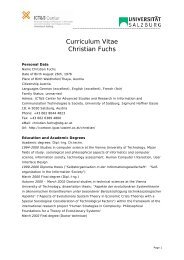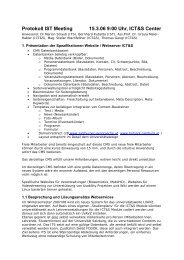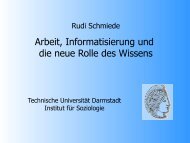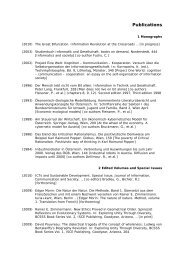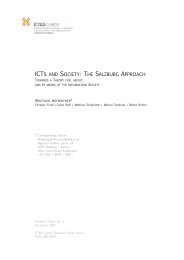CHRISTIAN FUCHS - ICT&S - Universität Salzburg
CHRISTIAN FUCHS - ICT&S - Universität Salzburg
CHRISTIAN FUCHS - ICT&S - Universität Salzburg
You also want an ePaper? Increase the reach of your titles
YUMPU automatically turns print PDFs into web optimized ePapers that Google loves.
Christian Fuchs: Social Networking Sites and the Surveillance Societycirculation function of the media, legitimatizing function of the media, advertising- andpublic-relations function of the media, regenerative function of the media, propagandamodel of the media, communicative action, dialogic communication, discursivecommunication, communication empire, transnational informational capitalism,working class culture, subculture, etc, under one united umbrella definition that seesthem as differentiated unity in plurality that is termed critical communication andmedia studies.Critical studies have to do with the Marxian“categoric imperative to overthrow all relations in which man is a debased,enslaved, abandoned, despicable essence, relations which cannot be betterdescribed than by the cry of a Frenchman when it was planned to introduce a taxon dogs: Poor dogs! They want to treat you as human beings!“ (MEW 1: 385 1 ).If we understand Marxian critique based on the critical categoric imperative as thecritique of all forms of domination and all dominative relationships, then all criticaltheory/research and therefore also all critical media and communication studies areMarxian-inspired.One important aspect of critical studies is that they focus on the critique of society astotality, i.e. they frame research issues by the macro context of the developmentdynamics of society as a whole. Herbert Marcuse has argued in this respect that criticalresearch analyzes and criticizes “the totality of the established world” (Marcuse1937/1988: 134). “It is more due to the theory’s claim to explain the totality of man andhis world in terms of his social being” (Marcuse 1937/1988: 134f). This focus of criticalresearch implies that the dominant two types of ISNS research, as conducted by technopessimistslike Alessandro Acquisti and Ralph Gross and techno-optimists like danahboyd, is uncritical because it does not focus on how ISNS are conditioned by thetotality of society. Counter to these uncritical approaches, it is the intention of this studyto make a critical analysis, which means to analyze how repressive qualities of thetotality, especially state surveillance after 9/11, capital accumulation and corporateprofits, and economic surveillance, shape ISNS. ISNS usage is conditioned by thecapitalist economy, the political system, and dominant cultural value patterns andconflicts.The foundation of critical ISNS research, which some might find discomforting, is thatthere are no easy solutions to societal problems. Such problems will neither disappearby using more or less technology or using technology differently nor by changingindividual behaviour. More fundamental political changes are necessary. Theimplication is that as long as there are corporate interests in technology and as long asthere is what some now term a new imperialism (Harvey 2003, Panitch/Leys 2004,Wood 2003) that has created the conditions for 9/11, the wars in Iraq, Afghanistan andthat creates a vicious mutual reinforcing cycle of terror and war, ISNS users will beconfronted by economic and political surveillance. As long as states see increasingsurveillance as an increase of security, there will be a decrease of privacy and freedom.1 Translation from: http://www.marxists.org/archive/marx/works/1843/critique-hpr/intro.htm, accessed onSeptember 30, 2008.21



